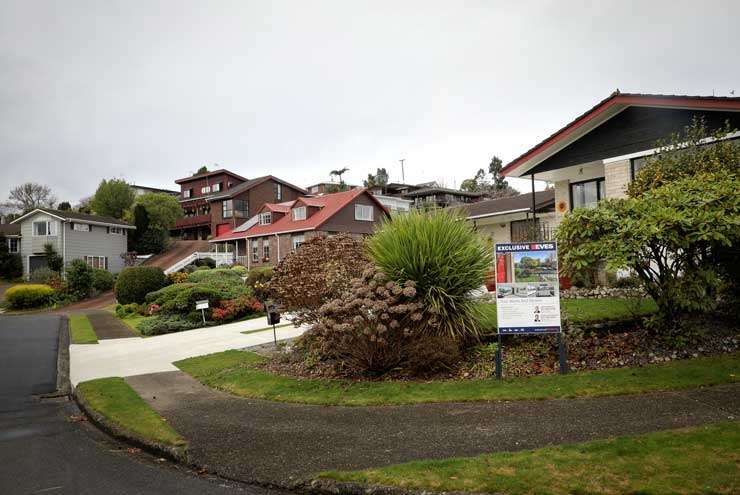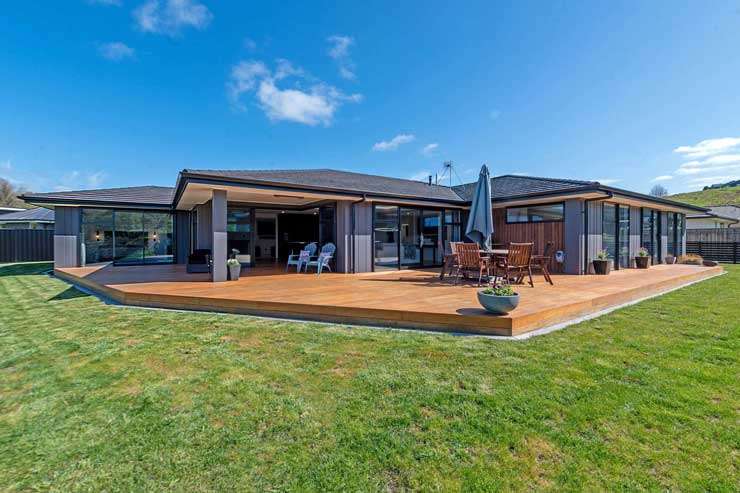New house price figures from OneRoof highlight the challenges in the Bay of Plenty’s second biggest city.
The average property value in Rotorua grew just 0.4% ($3000) in the last three months to $758,000, but the problems in the city’s housing market have been evident for some time.
In a year when homeowners in other cities have been enjoying house price growth of around 30% or more, homeowners in Rotorua had to make do with growth of 13.4% - the lowest growth YoY growth rate of all the territorial authorities in New Zealand.
Of the 58 suburbs in Rotorua TA, 27 suffered house price drops over the last three months or recorded no growth at all.
Start your property search
Taking the biggest hits over the quarter were three of the city’s highest value suburbs: Lake Tarawera and Lake Okareka, in the south, where the average property value dropped $86,000 and $74,000 respectively; and Matipo Heights, on the south western fringes, where the average property value fell $51,000.
Ngongotaha Valley, just above Matipo Heights, was the city’s biggest winner, with the average property value in the suburb growing $68,000 over the quarter to $1.43m.
By contrast, the average property value in the Western Bay of Plenty grew 8.1% over the quarter and homeowners in 19 suburbs saw gains of more than $100,000.
James Wilson, director of valuation at OneRoof’s data partner, Valocity, says homeowners in Rotorua shouldn’t hit the panic button, as the data suggests the value drops are more to do with what is selling – or not selling - in the city than a market meltdown.
“Sales in the last three months have all been at the lower end of the market, which suggests investors were moving on some of their stock. It might look like the values are coming off the boil but in reality it's just changing sales composition. “
Sales volumes are down around the country but the drop in Rotorua has been sharper, Wilson says.
“Investors had been active in the city for quite some time and they have pulled back.” At the same time, tougher credit laws and rising interest rates have had a negative impact on first home buyer activity.

Valocity director of valuations James Wilson says Rotorua’s market isn’t in meltdown but does face challenges. Photo / Fiona Goodall
The net result is while there is nothing to drive values backwards in Rotorua, there also isn’t the “demand frenzy” to drive them forward.
Wilson believes the stagnation in the market is likely to be temporary, Wilson says.
“Of course, in saying that, there is a lot more caution in the market now than there was 12 or 18 months ago, so Rotorua won't be immune to that.”
Driving house prices in the rest of the region has been an elevated demand for costal property over the past 18 months.
“There's been an absolute surge for coastal property since COVID first hit our shores,” Wilson says.
These areas also have a strong rental market at the moment which pulls in investors.
“There’s definitely been some investors there who I think traditionally would have been more interested in places like Tauranga and maybe Rotorua.”
Opotiki and Kawerau have also seen quite strong year on year growth, at 28.7 per cent and 19.6 per cent respectively, but Wilson says those figures are coming off low value growth.
There has, however, been a good surge of first home buyer activity in those areas with buyers priced out of larger centres looking further “down the road”.
“Those locations actually give really good news stories because you're actually seeing the market naturally swing in favor of the first home buyer because it fits their buying profile.”
Mark Nicol, sales manager for Tremains in Rotorua, says there is still plenty of inquiry for listings, especially from Aucklanders.

Houses in Kawaha Point, Rotorua. Photo / Andrew Warner
“I think they are showing fatigue from what's been happening with the Government and recent lockdowns which people are time and time again calling us saying it's just unnecessary and they are over it and they are trying to get out of the rat race and avoid any further input like that.”
But the median price has dropped in the last few months and the number of days to sell has increased from around 22 to nearly 30, he says.
Nicol, who moved to Rotorua in November from Auckland, says a good 60% of homes listed towards the end of last year are still on the market.
One section in Ngongotaha, being sold by another agency, was asking for inquiries over $600,000, but is now priced at $350,000, he says.
“I noted when I started looking there was pretty much nothing over $500,000 listed in the Rotorua area - there's probably a good dozen or more now.”
Properties at Kawaha Point, which features similar terraced homes, were going up $20,000 every two months but that’s stopped, too, he says.
“There is demand, don't get me wrong. We're still getting a good number of sales through but where we used to have five, six, seven offers on each property we're getting one or two.”
Jacqueline O’Sullivan, Ray White Rotorua’s owner/principal, says stock levels are increasing so buyers aren’t under as much pressure to pay outrageous sums for property.
“The prices are holding, they're not dropping, there's just maybe fewer people to open homes, fewer multi offers,” she says.

This family home in Matipo Heights, in Rotorua, sold in October last year for $1.45m. Photo / Supplied
“Last year we would have sometimes 10 offers on one property and I think the new restrictions the banks have introduced have put a stop on the first homebuyers really.
“Those are the ones that have been affected the most, the properties in the $500,000, $600,000, $700,000 price range. Either they go fast or they tend to sit now.”
Rotorua also relied heavily on tourism so jobs have been lost with some people moving on but O’Sullivan also says Rotorua is struggling with not enough land and subdivisions.
While there are a few on the go the council is slow to grant consents and not proactive, she says.
“To subdivide it can take 18 months and I can't see why it should take that long. Even a small subdivision, chopping your own section into a house (is) a good 18 months, and then you've got to find a builder to build your house and then there's a shortage of building materials.”
She’s not sure why Matipo Heights has dropped in value, saying it’s a nice area of newer homes.
“We sold one there that was a family home just recently for $1.45m. That was a two or three-year-old very nice house.”
Two sections have come on recently, which may sell in the $400,000s, with one at 42 Great West Road and the other at 57 Matipo Avenue.
There are still people game to build despite the increased costs and delays: “You just have to be prepared to wait for a while.”
















































































